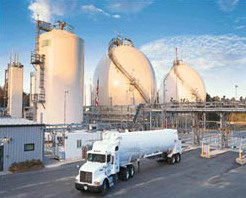Hydrogen economy
Hydrogen economy refers to a proposed system of delivering energy using hydrogen. The term is often used to describe a future in which hydrogen serves as an alternative to conventional fossil fuels and is used for both transportation and stationary energy generation. The concept hinges on the ability to produce, store, transport, and utilize hydrogen in a cost-effective and environmentally friendly manner.
Production[edit | edit source]
Hydrogen can be produced through various methods, the most common being steam methane reforming (SMR) and electrolysis. SMR involves reacting natural gas with steam to produce hydrogen, carbon monoxide, and a small amount of carbon dioxide. Electrolysis, on the other hand, uses electricity to split water into hydrogen and oxygen, with no emissions other than pure water if the electricity used is from renewable sources. Other methods include biomass gasification and the thermochemical splitting of water.
Storage and Transport[edit | edit source]
Storing and transporting hydrogen poses significant challenges due to its low energy density in both liquid and gaseous forms. Common storage methods include high-pressure tanks, liquid hydrogen in cryogenic tanks, and chemical storage in hydrogen carriers like ammonia. For transport, hydrogen can be moved via pipelines, in liquid form in cryogenic tankers, or as a chemical hydrogen carrier.
Usage[edit | edit source]
Hydrogen can be used in a variety of applications. In the transportation sector, it can power fuel cell vehicles (FCVs), which convert hydrogen directly into electricity, emitting only water vapor and warm air. In stationary applications, hydrogen can be used in fuel cells to provide electricity and heat for residential, commercial, and industrial purposes. It also has potential in the chemical industry as a feedstock for the production of ammonia, methanol, and other chemicals.
Environmental Impact[edit | edit source]
The environmental impact of a hydrogen economy depends largely on how the hydrogen is produced. Hydrogen produced from renewable energy sources or from nuclear power can significantly reduce greenhouse gas emissions compared to conventional fossil fuels. However, hydrogen produced from natural gas without carbon capture and storage (CCS) technology still releases carbon dioxide into the atmosphere.
Challenges[edit | edit source]
The transition to a hydrogen economy faces several challenges, including the high cost of hydrogen production, storage, and distribution infrastructure; the need for advancements in technology to improve efficiency and reduce costs; and the need for policies and regulations that support the development of a hydrogen market.
Future Prospects[edit | edit source]
The future of the hydrogen economy depends on ongoing technological advancements, cost reductions, and supportive policies. Governments and industries worldwide are investing in hydrogen technologies as part of broader strategies to reduce carbon emissions and combat climate change.
Search WikiMD
Ad.Tired of being Overweight? Try W8MD's physician weight loss program.
Semaglutide (Ozempic / Wegovy and Tirzepatide (Mounjaro / Zepbound) available.
Advertise on WikiMD
|
WikiMD's Wellness Encyclopedia |
| Let Food Be Thy Medicine Medicine Thy Food - Hippocrates |
Translate this page: - East Asian
中文,
日本,
한국어,
South Asian
हिन्दी,
தமிழ்,
తెలుగు,
Urdu,
ಕನ್ನಡ,
Southeast Asian
Indonesian,
Vietnamese,
Thai,
မြန်မာဘာသာ,
বাংলা
European
español,
Deutsch,
français,
Greek,
português do Brasil,
polski,
română,
русский,
Nederlands,
norsk,
svenska,
suomi,
Italian
Middle Eastern & African
عربى,
Turkish,
Persian,
Hebrew,
Afrikaans,
isiZulu,
Kiswahili,
Other
Bulgarian,
Hungarian,
Czech,
Swedish,
മലയാളം,
मराठी,
ਪੰਜਾਬੀ,
ગુજરાતી,
Portuguese,
Ukrainian
Medical Disclaimer: WikiMD is not a substitute for professional medical advice. The information on WikiMD is provided as an information resource only, may be incorrect, outdated or misleading, and is not to be used or relied on for any diagnostic or treatment purposes. Please consult your health care provider before making any healthcare decisions or for guidance about a specific medical condition. WikiMD expressly disclaims responsibility, and shall have no liability, for any damages, loss, injury, or liability whatsoever suffered as a result of your reliance on the information contained in this site. By visiting this site you agree to the foregoing terms and conditions, which may from time to time be changed or supplemented by WikiMD. If you do not agree to the foregoing terms and conditions, you should not enter or use this site. See full disclaimer.
Credits:Most images are courtesy of Wikimedia commons, and templates, categories Wikipedia, licensed under CC BY SA or similar.
Contributors: Prab R. Tumpati, MD





